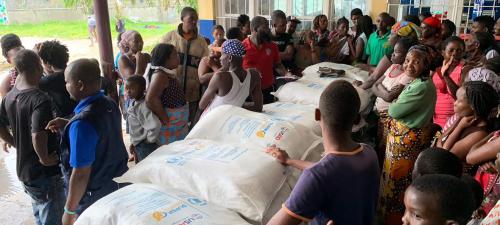Cyclone Idai: emergency getting ‘bigger by the hour’, warns UN food agency
The full scale of the devastation caused by Tropical Cyclone Idai in south-west Africa is becoming clearer, the UN said on Tuesday, warning that the emergency “is getting bigger by the hour”.

Food distribution in Beira, Mozambique. At this school turned into a shelter, 70 families received food from WFP. Most of them had to leave their homes because they were damaged by the cyclone.
Five days after the storm made landfall in Mozambique, causing widespread damage and flooding, at least 1,000 people are feared dead there alone.
Victims are reportedly trapped on roofs and clinging to trees awaiting rescue, UN agencies said, while across Mozambique, Malawi and Zimbabwe, tens of thousands of people have lost their homes, while roads, bridges and crops have been washed away.
“We are talking about a massive disaster right now where hundreds of thousands -in the millions of people – (are) potentially affected,” said Jens Laerke from the UN Office for the Coordination of Humanitarian Affairs (OCHA). “We need all the logistical support that we can possibly get.”
Although floodwaters have reportedly begun to recede in Zimbabwe and Malawi, allowing some people to return home, the World Food Programme (WFP) warned that Mozambique is facing “a major humanitarian emergency that is getting bigger by the hour”.
An estimated 1.7 million people were in the path of the cyclone in Mozambique, WFP spokesperson Herve Verhoosel told journalists in Geneva, in addition to the 920,000 people affected in Malawi and “thousands more” impacted in Zimbabwe.
Flooding resembles ‘inland oceans’
Aid access is “the biggest challenge”, the WFP spokesperson insisted, while the agency reported that staff members who flew over the area inundated since the weekend, when two swollen rivers burst their banks, spoke of “inland oceans extending for miles and miles”.
In Mozambique, WFP aims to support 600,000 people affected by the cyclone, which struck with wind speeds in excess of 150 kilometres per hour. In Malawi, the UN agency plans to target 650,000 people with food assistance.
Amid the humanitarian response, heavy rain is continuing and more is forecast, according to Clare Nullis, spokesperson for the World Meteorological Organization (WMO). “The Mozambican President is quoted as saying they are fearing there are more than 1,000 casualties,” she said. “If these reports, these fears are realized, then we can say that this is one of the worst weather-related disasters - tropical cyclone-related disasters - in the Southern hemisphere.”
Thousands fighting for their lives on rooftops, in trees
UN Children’s Fund UNICEF confirmed the scale of the emergency, noting that 260,000 children have been affected in Mozambique, which bore the brunt of Idai.
“Many people are in desperate situations, several thousand are fighting for their lives at the moment sitting on rooftops, in trees and other elevated areas,” said spokesperson Christophe Boulierac. “This includes families and obviously many children.”
Gerald Bourke, WFP's Regional Communications Officer for Southern Africa, told UN News on Tuesday morning, that the "key concern is for those people who have been stranded, isolated by the flood waters...People that have overflown the area speak of inland oceans, running for mile after mile, with water above tree level."
Matthew Cochrane, spokesperson for the International Federation of Red Cross and Red Crescent Societies (IFRC), underlined the perilous situation, noting that colleagues “talked of flooding perhaps in parts as deep as six metres, covering roofs, covering palm trees covering telephone poles”.
WFP hails ‘incredible pilots’ delivering vital food aid
To date, WFP has coordinated airlifts of high-energy biscuits, water and blankets to people crammed on rooftops and elevated patches of land outside the port city of Beira, where 90 per cent of buildings are damaged, including the agency’s warehouse and port unloading machinery.
“It was very difficult to land a plane like this,” said Mr. Verhoosel. “Can you imagine in an airport, damaged by the water, dark with no light or radio communication with the control tower, nothing. I mean, those pilots are incredible."
Four tonnes of biscuits are to be delivered by air later on Tuesday, in addition to the 1.2 tonnes dispatched on Monday - part of a 20-tonne consignment flown in from Dubai.
Negotiations are also “at an advanced stage” to bring in two freight aircraft to Beira, including a Hercules C-130, the agency said.
To respond to people’s health needs, Christian Lindmeier from the World Health Organization (WHO) explained that the initial priority is helping those with crush and trauma injuries.
“So for the immediate needs, WHO is positioning health kits, emergency health kits, trauma kits and also cholera kits in order to be able to assist people on the ground, as soon as these kits gets there,” he said.
Longer-term needs will include dealing with a potential rise in waterborne diseases and rebuilding “many destroyed health centres”, the WHO spokesperson added.
Source:United Nations
- 261 reads
Human Rights
Ringing FOWPAL’s Peace Bell for the World:Nobel Peace Prize Laureates’ Visions and Actions

Protecting the World’s Cultural Diversity for a Sustainable Future

The Peace Bell Resonates at the 27th Eurasian Economic Summit

Declaration of World Day of the Power of Hope Endorsed by People in 158 Nations

Puppet Show I International Friendship Day 2020

